Sony WF-1000XM5 vs Sennheiser Momentum True Wireless 4: Which wireless earbuds win?
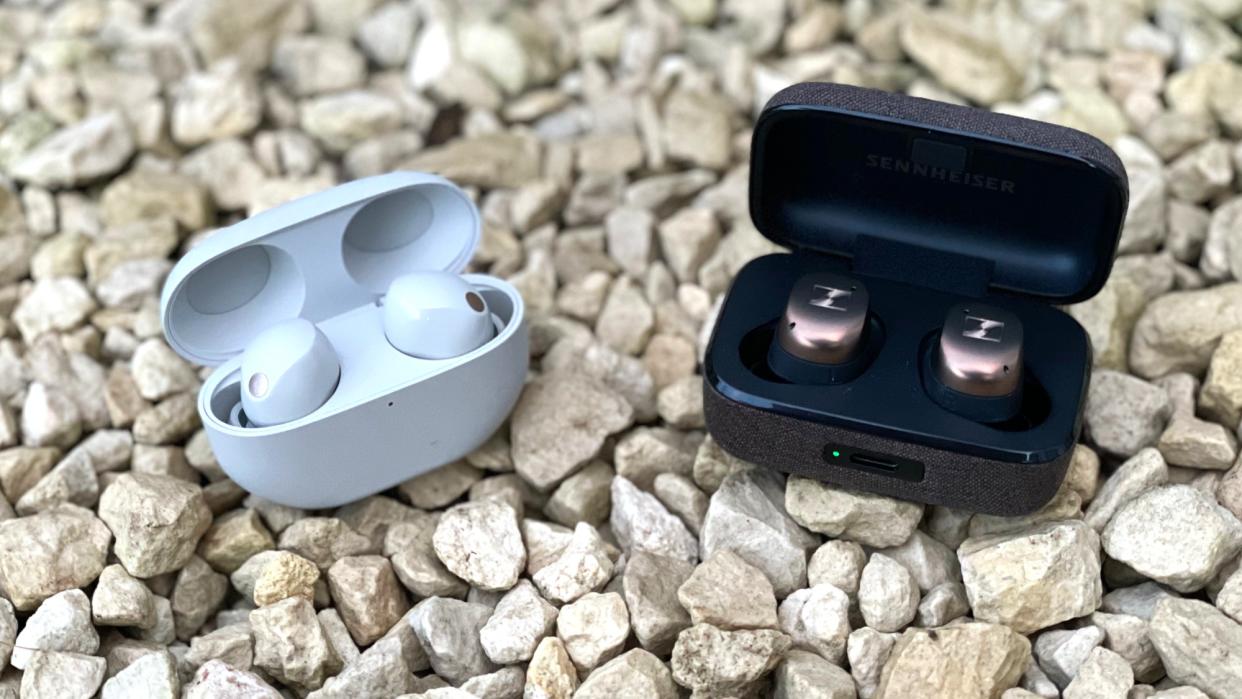
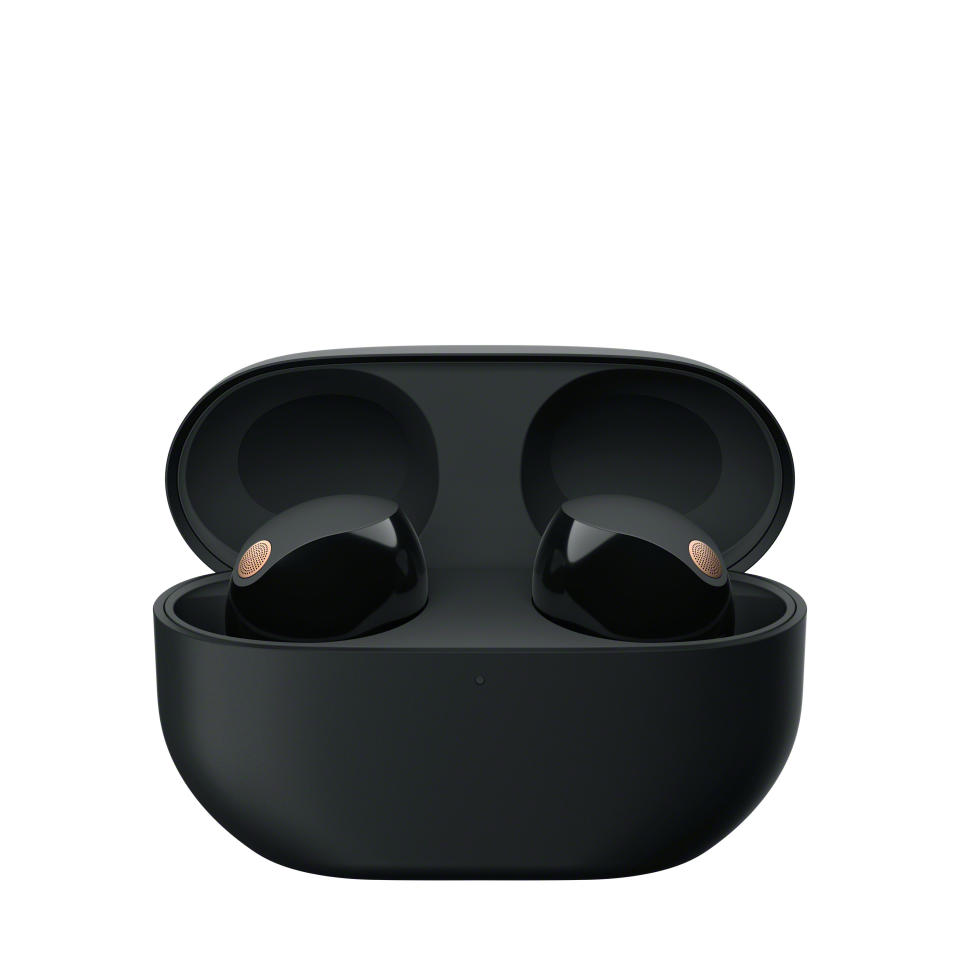
Sony WF-1000XM5
Sony's flagship noise canceling wireless earbuds have pretty much everything you could hope for thanks to the latest Sony V2 audio processor that enables powerful Bluetooth 5.3 connectivity, stronger sound and even better active noise cancelation. There's an updated Headphones Connect app too, offering stronger customization and adaptive sound features.
For
Outstanding sound quality
Strong noise cancelation
Exceptional functionality
Excellent level of control
Against
Smaller earbud size affects eartip seal and fit
Battery life remains the same as predecessor
Flaky 360 Reality Audio personalization set up
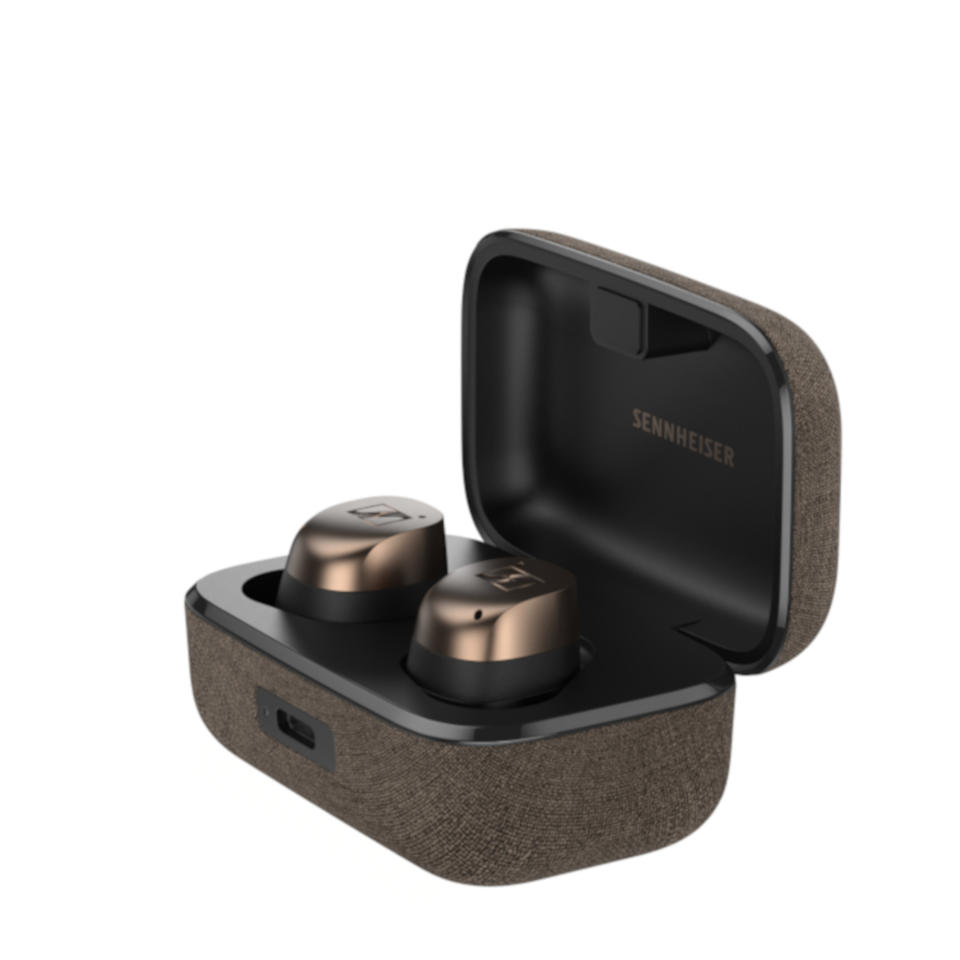
Sennheiser Momentum True Wireless 4
Sennheiser's next-gen wireless earbuds look identical to their predecessor but bring a significant boost with stronger connectivity and wider audio support, and have a level of performance that closely rivals the Sonys. The price is in line with Bose and Sony flagships.
For
Balanced audiophile sound
Class-leading aptX Lossless audio support
Strong sound personalization features
Effective ANC performance
Against
Bulky design compared to price rivals
Auracast and LE Audio support isn't available immediately
The competition to be champion of the best wireless earbuds market is heating up, as Sennheiser's next-gen noise-canceling earbuds arrive and enter the ring. Just when the Sony WF-1000XM5 looked like they were sitting at the top of the sector by a comfortable margin, along comes the Sennheiser Momentum True Wireless 4 buds with improved Bluetooth specs and reliability, and a re-tuned sound signature to miraculously move performance and features on beyond expectations and challenge Sony's crown.
Both are flagship models packed with adaptive noise-cancelation and top-tier audio performance in practical designs. It's no secret that I've been using the Sony flagship earbuds since I carried out my review. I have found that the earbuds are nothing short of excellent, particularly with LDAC streams from compatible devices.
Although the Sennheiser Momentum TW4 wireless earbuds don't support LDAC, they do have aptX Lossless and aptX Adaptive support for higher-quality streams and Bluetooth 5.4 with LE Audio. Plus, Auracast support is coming in a future firmware update. Both models are priced at $299 and are top options for Android users. But which model is better? Read on to find out.
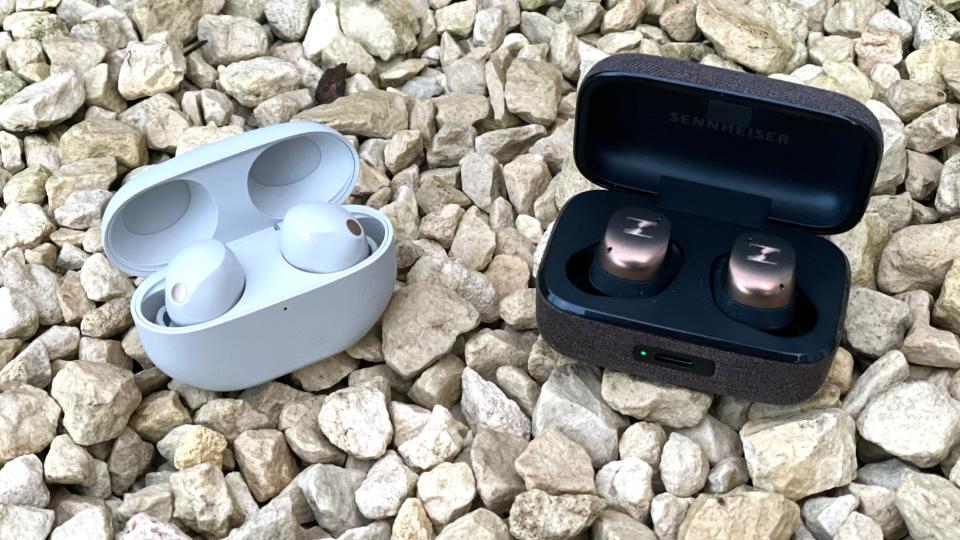
Sony WF-1000XM5 vs Sennheiser Momentum True Wireless 4: Specs compared
Sony WF-1000XM5 vs Sennheiser Momentum True Wireless 4: Price and availability
Both models are priced at $299 / £259 / AU$499 and sit towards the top of the market's pricing structure. Some of the best wireless earbuds I recommend for audiophile sound push prices even further, but there are two closely matched flagship models stacked with features and high-level performance to showcase the makers' prowess.
It's surely no coincidence that Sennheiser priced the Momentum TW4 the same as the Sony, but it's a considerable increase compared to the MSRP of the Momentum TW3 predecessor that originally launched at ($249 / £219 / AU$399). Whichever model you go for, you'll get a big-brand experience.
Winner: Tie
Sony WF-1000XM5 vs Sennheiser Momentum True Wireless 4: Design and fit
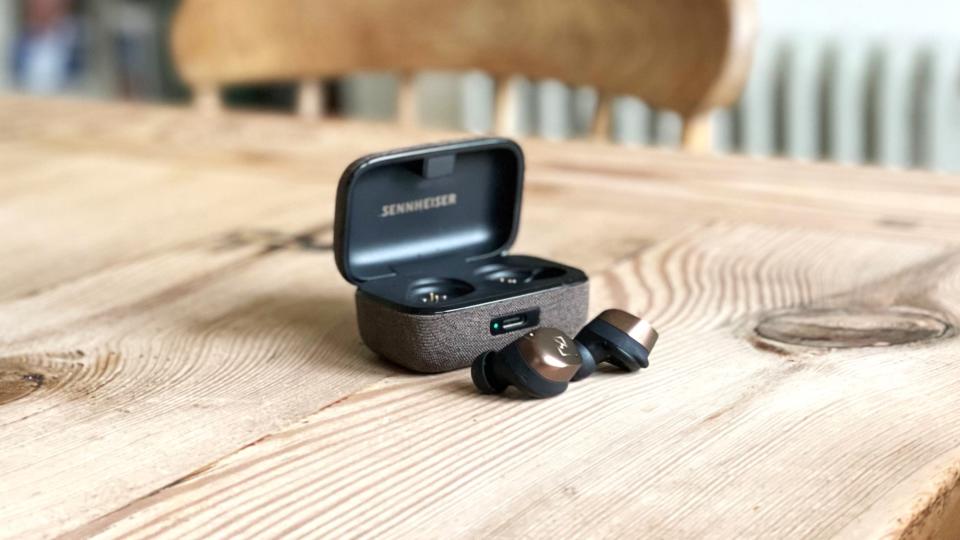
Sony made the WF-1000XM5 25% smaller than the previous-gen XM4 earbuds, and as such some users may find the fit a bit tricky. They retain their traditional form, donning a simple rounded shape with a protruding ear tip. There are four foam tips supplied including a new XS size to ensure smaller ears can find the best seal. The WF-1000XM5 wireless earbuds come in black and silver options only.
Sennheiser's TW3 showcased a redesign that was 16% smaller than the model they replaced, and the TW4 follows the same design. In comparison to the Sony buds, the styling feels a bit bulky, although I do like the new black copper finish — silver and graphite options are also available. Like the Sony, they come with four sizes of ear tips, and the chunky outer casing makes them easier to get the right fit the first time.
Winner: Sennheiser Momentum True Wireless 4
Sony WF-1000XM5 vs Sennheiser Momentum True Wireless 4: Features
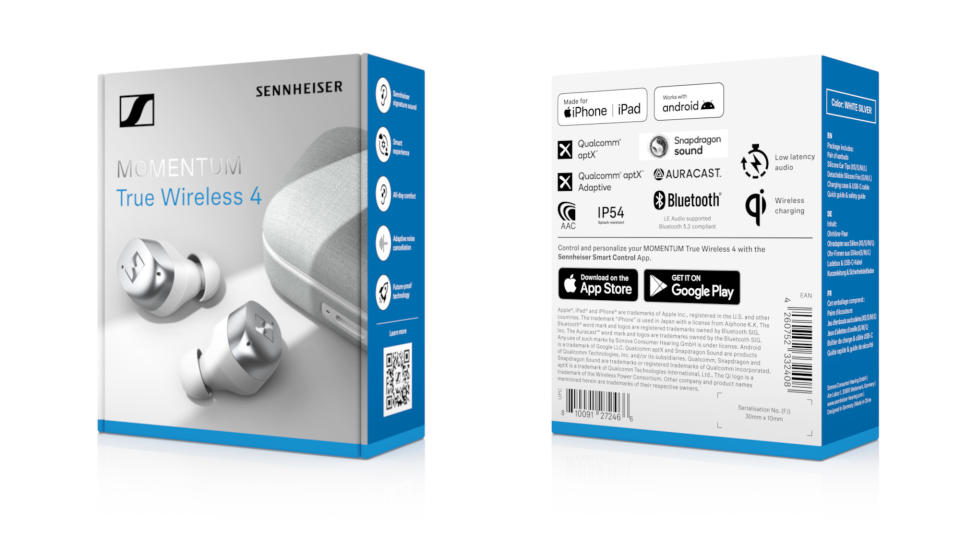
Both models have adaptive modes to dynamically control the level of active noise cancelation in your surroundings. Sony's ANC is more effective and gets close to the pool of silence achieved by the Bose QuietComfort Ultra Earbuds — the best noise-canceling earbuds overall.
Sony has 20 different Ambient Sound mode levels in its Headphones Connect app, while the Sennheiser Momentum TW4 has Low, Mid, and High transparency settings. Both models are effective.
In terms of spatial audio support, the Sony earbuds offer Sony 360 Reality Audio support, while the Sennheiser doesn't appear to support any kind of spatial audio tech.
There are reliable ear-detection sensors fitted to both models to automatically pause playback when a bud is removed from your ear. Playback resumes once the earbuds are re-inserted. The Sony supports single-bud mode playback and appears to detect and enable single-mode automatically with just one bud inserted in the ear. The Sennheiser doesn't appear to support single-bud use, but this could easily be addressed in a future firmware update.
While the XM5s have LDAC support for high-quality streams over Bluetooth from compatible devices, the Sennheiser Momentum TW4 have aptX Lossless, aptX Adaptive, and Bluetooth LE Audio from compatible Android devices. They'll also be able to support Auracast audio-sharing in a future firmware update. This will make the TW4 one of the first wireless earbuds to enable listeners to hear audio shared from nearby compatible devices and Auracast-powered public transmitters that can beam public announcements at train stations and airports straight to the earbuds.
Winner: Tie
Sony WF-1000XM5 vs Sennheiser Momentum True Wireless 4: Controls
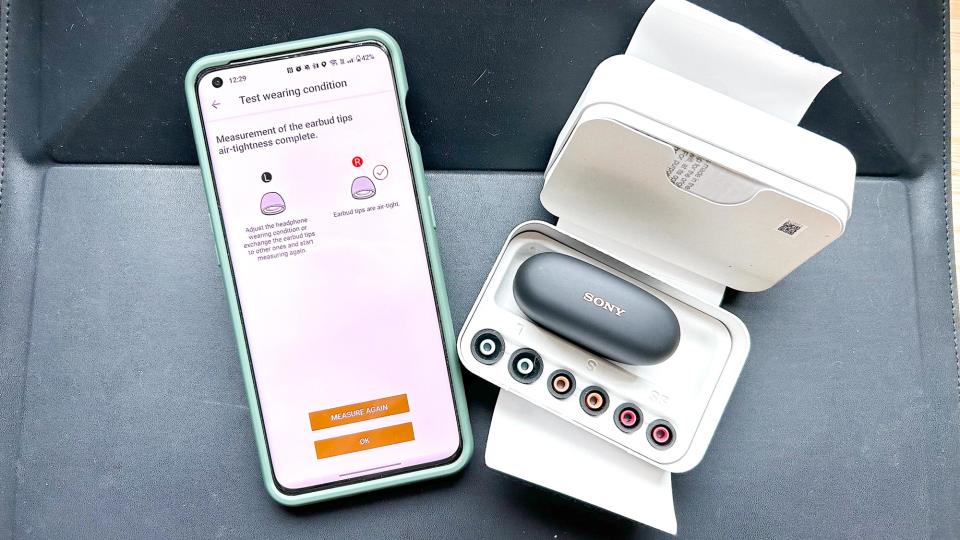
In terms of touch controls, these two models are very closely matched. Both have excellent tap commands to navigate playback, change volume, and activate noise-canceling modes. Controls can be assigned to individual buds and have the familiar single, double, and triple taps or long-press methods. Both have audible feedback to acknowledge commands, but somehow I felt that the Sennheiser gave clearer confirmation of my actions.
Both models enable users to activate a device's native voice assistant, while the Sony's are also compatible with Alexa.
Winner: Tie
Sony WF-1000XM5 vs Sennheiser Momentum True Wireless 4: Sound quality

I love the sound of the Sony WF-1000XM5, but my listening test comparisons with the Sennheiser Momentum True Wireless 4 make choosing a winner tough to call. I've consistently found the Sony WF-1000XM5 one of the most rewarding listening experiences when it comes to audio over Bluetooth. Thanks to their LDAC support with compatible playback devices, they deliver the most engaging listening experiences I've heard from a compatible Android phone, but the Sennheiser's sound is remarkably close and in some ways is even better.
Sennheiser says that the TW4's internal design features a new acoustical system and a redesigned sound signature. They sounded remarkably balanced across the entire frequency range straight out of the box. The factory-set sound signature was very enjoyable, but I found I was able to improve things even further via the sophisticated Sound Personalization mode.

Then there are the Sennheiser's aptX Lossless audio capabilities, which improve on LDAC to deliver close to CD-quality over Bluetooth, but the hardware that supports it is pretty limited so far.
Overall, the Sony still edges it for me in terms of high-quality sound over Bluetooth, but the Sennheiser comes remarkably close.
Winner: Sony WF-1000XM5
Sony WF-1000XM5 vs Sennheiser Momentum True Wireless 4: ANC
Competition for the best noise-canceling earbuds is extremely tough. Sony's WF-1000XM5 achieve remarkably strong noise-canceling tech that sees them rank close to the class-leading Bose QuietComfort Ultra Earbuds. Sony claims they reduce ambient noise significantly more than their predecessor. That's difficult to measure, but the combination of Sony's more powerful V2 chipset and HD Noise Canceling processor certainly seem to deliver remarkably effective results.
Sennheiser doesn't make any similar claim, but they hold their own even if they don't quite block out external sounds to the same level. With Adaptive Noise Canceling enabled, it was still possible to pick out occasional sounds from the Sonos speaker playing along in my home office, and the Sennheiser's sonic signature has a slightly altered presentation when ANC mode is switched off.
One useful feature is the Anti-Wind setting that’s available in the Sennheiser Smart Control app. The earbuds protrude slightly from each ear, and the outer casing seems prone to catching gusts of wind. But with the Anti-Wind mode enabled while standing on an exposed and blowy train station platform, it was effective at making the sound of the wind disappear.
Winner: Sony WF-1000XM5
Sony WF-1000XM5 vs Sennheiser Momentum True Wireless 4: Battery life
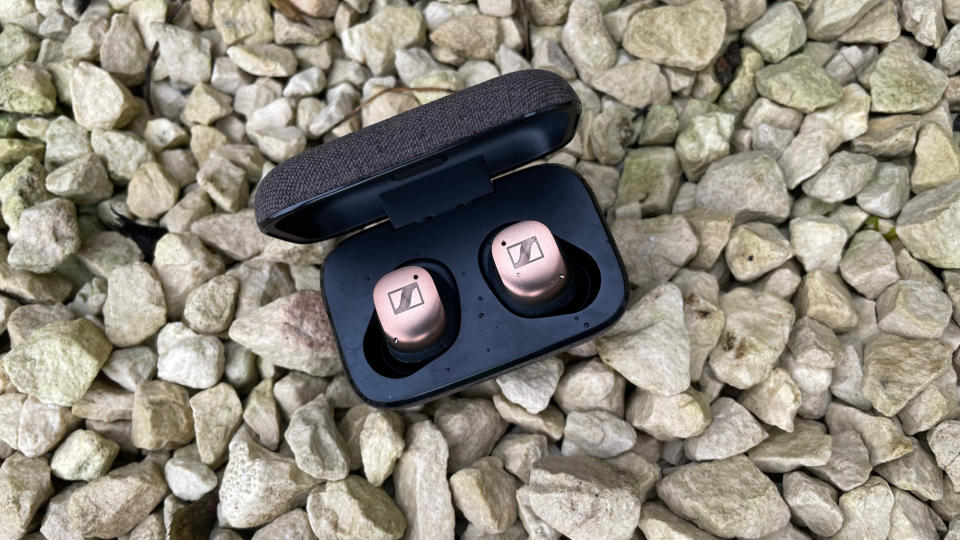
While the battery life of earbuds will vary depending on how you use them, the Sony WF-1000XM5 averages 8 hours of listening with ANC on and 12 hours off. The charging case can hold up to 24 hours of total charge.
The Sennheiser Momentum True Wireless 4 offers 7.5 hours, and users will get 30 hours from the charging case with ANC off. A quick charge is said to provide up to 1 hour of additional listening from just 8 minutes of charging. The USB-C charging case has Qi wireless support.
The battery life on Sennheiser's wireless earbuds falls short compared to the Sony WF-1000XM5, which lasts longer with ANC enabled.
Winner: Sony WF-1000XM5
Sony WF-1000XM5 vs Sennheiser Momentum True Wireless 4: Verdict
The Sennheiser Momentum True Wireless 4 earbuds are shaking up the best wireless earbuds market. While the TW3 buds were good, I wasn't anticipating Sennheiser's next-gen version giving the Sony WH-1000XM5 a run for the money. But they do!
These are two of the best flagship wireless earbuds around right now. It's a close-run thing on features and performance, and while I'd be happy to listen to either model for hours on end playing my Tidal playlist, the Sony's continue to have the edge thanks to their extensive feature capabilities and stronger battery life.
